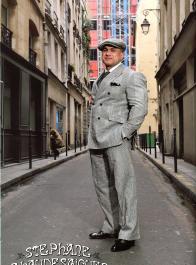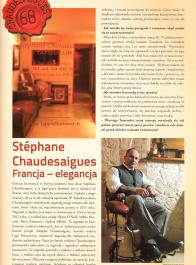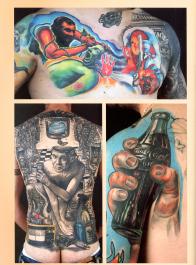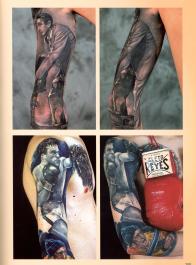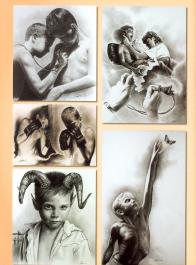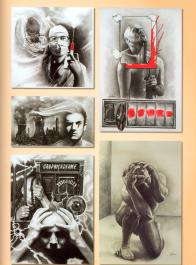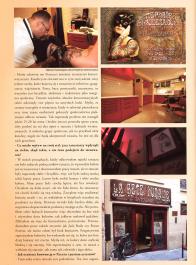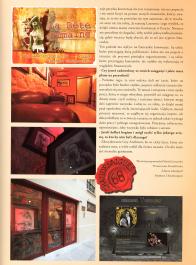TATUAZE STÉPHANE CHAUDESAIGUES LA FRANCE- L'ÉLÉGANCE
Our booth at the Paris tattoo convention was right next to Stéphane Chaudesaigues’, so we got to spend time with him. Stéphane likes to chat and always has something interesting to say.
To set the background, know that the Chaudesaigues Award is the brainchild of a very creative family of well-rounded artists. Created to bring recognition to the best tattoo artist of 2012, the award will be handed out in February 2012 in the United States by a jury comprised of S.O'Neill, N.Hurtado, Boris and A.Afferni. The prize is somewhat of a family tradition because back in the XIX Century, Eusèbe Chaudesaigues, knight of the French Légion d’Honneur, had himself created a prize to reward a deserving student in architecture. Logically, the Chaudesaigues family decided to update the prize to reward a tattoo artist in this century.
The prize was born of the love of two brothers, the love of a father for his children and of a man for his work. In the Chaudesaigues household, tattooing is now spreading across generations too, and Stéphane is very attached to the concept of family traditions.
We feel lucky for the candid discussion we had with Stéphane about his passion for his family, for tattooing and for how he sees the tattoo scene in France.
How did you start tattooing?
I am 43 now, but I’ve been interested in tattoos since I was 11. Later, I opened my first tattoo shop, but my inspiration came mostly from my dad’s tattoos. If he wasn’t around much when I grew up, my brother had a lot of tattoos too. This is what motivated me to learn how to sling ink. When I grwe up, everyone in my neighborhood would associate tattoos with low-life people and shady characters, but to me, they were an expression of strength and would give you respect in the streets. I found out much later how tattooing was done with a machine, but back then the quality of tattoos was very different.
What’s the French tattoo scene like ?
There are loads of great artists out there, but our French nature has us thinking that we’re ahead of everyone else, which isn’t always the case. Thanks to the media however, many of us get a healthy dose of reality from time to time, and that’s good because it keeps us more focused on learning and practicing our art to keep up with the competition.
Why do you think tattooing took so long to fully grow in France? There was no shortage of seaports and lots of colonial activity in the 19th Century, and the Second World War too…
I think that deep down French people are very conservative and that the Catholic religion may have had a role in this delay. For the longest time, only hoodlums, pimps, prostitutes, convicts, legionnaires and sailors were inked; they represented all that was shady and dubious in our society. And the kind of tattoos that prisoners were forced to get in the concentration camps left an indelible and undesirable mark on our collective mindset.
I think that things changed when we started seeing celebrities with tattoos 15 or 20 years ago. That was certainly a positive influence, but I feel that it will take more time before skin art is more widely accepted. There are still social groups where tattooing is seen as a terrible thing and a sin, like with the more hardcore Catholics.
Who has influenced your style and how did you perfect your technique?
There were no instructional manuals on how to operate when I though about becoming a tattooist. So I would observe the artists who did work on me, but it was different back then; tattoos were often poorly done and looked awful. At the time, I thought that I could easily do better and my first tattoos looked better than most, but not by much. I really wanted to improve my technique, but information was hard to come by, as tattooists weren’t willing to share their knowledge.
This is when I started studying art history; it led me to try to reproduce on skin what I saw in art books. With enough work and effort, I started seeing results and I got better. Since I wasn’t good at laying down neat outlines, I relied more on color fills (as you would do with a paint brush) to define my subjects. This is how I got to master photo-realism and the art of the portrait. I studied J. Rudy and B. Everett’s work, but I just couldn’t get their outline technique down. Then I stepped away from using too much color and relied more on black. I find that colors will fade over time, faster than black does. Keep in mind that tattoos will get old over time, just like we do.
What are your thoughts on the Paris convention and the level of artists in attendence?
We have a pretty divided tattoo scene in France. The promoter of this event is not a tattoo artist and he cannot count of the help of established tattoo artists; they think that he has no business organizing a convention in the first place. I respect Laurent for his effort and thanks to him, there will be a convention in Paris each year. Sadly we can’t seem to all work together to help make this event bigger and better because we’re too divided; that’s so typically French... The problem lies in the fact that some conventions bring big business by appealing to a less passionate crowd, while the more specialized and focused conventions will attract great artists and enthusiasts, but won’t live on so long because they’re not profitable.
Are you a happy man? What are your plans for the future ?
I have had a hard life, but tattooing has changed things for the better in the end. I owe everything I have to tattooing; I am talking about my family and my six kids. I love what I do and my passion has allowed me to meet fascinating people. If I ever had to stop tattooing, I would probably move on to organizing shows and conventions. Of course it’s a lot of work and dedication, but what matters is that you put your heart into it.
If you were God and had to spare an artist from certain death, who would you choose and why?
G. Aitchison for sure. He’s a great guy who’s nice and always minds his business. He doesn’t look for trouble and doesn’t brag, even though he would have every right to. I think he’s the closest thing to a genius that you will ever see.


